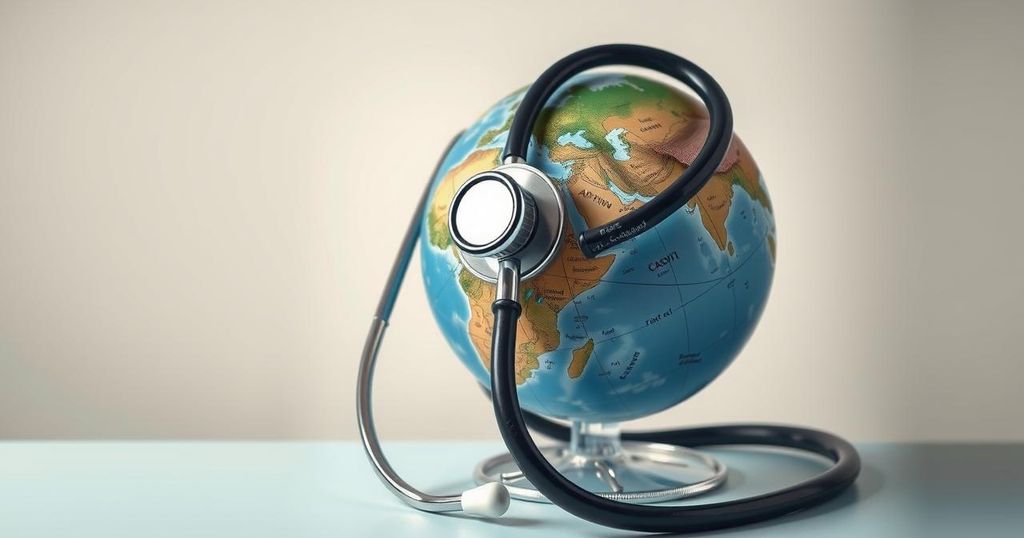Impact of US Funding Cuts on HIV/AIDS Programs in Africa

Funding reductions from the US government to HIV/AIDS programs could lead to up to 500,000 deaths in South Africa alone over the next decade. UNAIDS and local health organizations have raised alarms about the severe disruptions to essential services due to these cuts. Countries in Africa are urgently seeking alternative funding, while some governments are attempting to mitigate the impacts through local initiatives and emergency support expenditures.
Recent funding cuts by the United States government to HIV/AIDS programs in Africa are anticipated to result in significant fatalities. Health experts warn that in South Africa alone, these cuts could lead to half a million deaths over the next decade, as stated by an official from the Desmond Tutu HIV Center. Cuts have begun affecting various programs, exacerbating the already dire health crisis across the continent related to the HIV epidemic.
The abrupt pause of foreign aid assistance after the inauguration of President Donald Trump, as well as nearly 90 percent cuts to contracts from the US Agency for International Development (USAID), has significantly impacted HIV/AIDS activities. Furthermore, the decision to withdraw funding from UNAIDS, the UN program dedicated to combating HIV/AIDS, detrimentally affects global health initiatives that support numerous communities in need.
Currently, approximately 25 million people in sub-Saharan Africa live with HIV. PEPFAR, launched in 2003, has been instrumental in saving countless lives by providing vital resources. Following the aid reductions, health services in many African nations, including testing and treatment for HIV, have been disrupted, putting millions at risk of losing essential care.
Linda-Gail Bekker, Chief Operating Officer of the Desmond Tutu HIV Center, emphasized that these funding cuts would cause severe consequences. “We will see lives lost; in excess of half a million unnecessary deaths will occur because of the loss of the funding,” she stressed. Many who were previously receiving antiretroviral therapy are now at risk of treatment interruptions due to the cancellation of grants deemed misaligned with US priorities.
African countries are facing immense challenges, with nations like South Africa and Mozambique reporting clinic closures and loss of services critical to combatting HIV. In South Africa, reports indicate that areas hit hardest, such as KwaZulu-Natal, see burgeoning patient numbers at remaining facilities, indicating a burgeoning healthcare crisis. Salient points from the UN reveal that over 400,000 individuals in Ivory Coast are affected, with hundreds of facilities being shut down.
In response, South Africa’s government has initiated efforts to bolster its healthcare system in light of the funding deficits. President Cyril Ramaphosa announced a campaign targeting HIV treatment adherence in regions most affected by the epidemic. Meanwhile, other countries, such as Nigeria, have allocated supplemental funding to bridge healthcare gaps caused by the US aid cuts.
As the situation escalates, there are discussions surrounding potential alternative funding sources, including increased financial support from UNAIDS or the European Union. Although the EU has historically provided substantial funding for development assistance, the immediate outcome of US aid cuts remains uncertain, causing considerable concern among health experts regarding the continuity of critical health services needed to fight HIV/AIDS effectively.
The cessation of US funding for HIV/AIDS programs poses a severe threat to public health in Africa, with potential casualties numbering in the hundreds of thousands. Countries such as South Africa face significant disruptions in healthcare services critical for the management of the HIV epidemic. Efforts to address these issues must come from both domestic initiatives and possible international collaborations, particularly from the EU and organizations like UNAIDS, if the impacts of these funding cuts are to be mitigated.
Original Source: www.aljazeera.com







